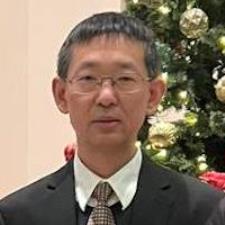
Kasim K.
asked • 10/07/20LINK LISTS C++ PROGRAMMING
Write down a C++ program to implement the link list in the following way.
a) Create an array taking 10 values from the user.
b) Create a link list and fill it (insert nodes) with the array values.
c) Display the link list
d) Run the 9 commands given in the table on slide 9.
e) Create functions for the following and implement these in order
(i) Insert a new node in front of the list and display the list.
(ii) Insert a new node at the end of the list and display the list
(iii) Delete first node from the list and display the list.
(iv) Search for a value in the list (user entered).
Note: The program must be well structured and properly commented.
1 Expert Answer

Patrick B. answered • 10/08/20
Math and computer tutor/teacher
using namespace std;
#include <iostream>
#include <stdlib.h>
#define POSITION_FIRST (1)
#define POSITION_LAST (0)
typedef struct _TListNode
{
int key;
struct _TListNode * next;
} * TListNode;
#define LIST_NODE_SIZE ( sizeof(struct _TListNode))
typedef struct _TLinkedList
{
TListNode head;
TListNode tail;
int count;
} * TLinkedList;
// creates empty list
void LinkedList_Init(TLinkedList linkedList)
{
linkedList-> head= linkedList->tail=NULL;
linkedList->count=0;
}
//returns -1 if malloc fails
int LinkedList_Push( TLinkedList linkedList, int n, bool posFlag=true)
{
int iReturn=0;
TListNode newListNode = (TListNode) malloc(LIST_NODE_SIZE);
if (newListNode != NULL) //good malloc
{
newListNode->key = n; //copies the data
newListNode->next=NULL;
if (linkedList->count==0) //list is empty
{
linkedList->head= linkedList->tail = newListNode;
linkedList->count=1;
}
else if (linkedList->count==1) //only one node
{
if (posFlag) //inserts at head
{
linkedList->head=newListNode;
linkedList->head->next=linkedList->tail;
}
else //inserts at tail
{
linkedList->tail = newListNode;
linkedList->head->next=linkedList->tail;
}
linkedList->count=2;
}
else //there are 3 or more nodes
{
if (posFlag)
{
//inserts at head
newListNode->next = linkedList->head;
linkedList->head = newListNode;
}
else
{
//inserts at tail
linkedList->tail->next = newListNode;
linkedList->tail = linkedList->tail->next;
}
linkedList->count++;
}
//newListNode=NULL;
}
else
{
iReturn=-1;
}
return(iReturn);
}
//displays the list in order
void LinkedList_Display( TLinkedList linkedList, char * strMsg=NULL)
{
TListNode cur = linkedList->head;
cout << "*****************************************" << endl;
if (strMsg!=NULL)
{
cout << strMsg << endl;
cout << "******************************************" << endl;
}
for (int iLoop=0; iLoop<linkedList->count; iLoop++)
{
cout << cur->key << endl;
cur = cur->next;
}
}
//removes node from head or tail based on posFlag; returns the integer data of the deleted node
// or -1 if the list is empty
int LinkedList_Pop( TLinkedList linkedList, bool posFlag=true)
{
int iReturn=-1;
if (linkedList->count>0) //not allowed to pop an empty list
{
if (linkedList->count==1) //removes the one and only node
{
iReturn = linkedList->head->key;
free(linkedList->head);
linkedList->head = linkedList->tail = NULL;
linkedList->count=0;
}
else if (linkedList->count==2) // there are 2 nodes
{
if (posFlag) // removes the head node
{
iReturn=linkedList->head->key;
free(linkedList->head);
linkedList->head = linkedList->tail;
}
else //removes the tail node
{
iReturn = linkedList->tail->key;
free(linkedList->tail);
linkedList->tail = linkedList->head;
}
linkedList->count=1;
}
else // there are 3 or more nodes
{
if (posFlag) //removes from head
{
iReturn = linkedList->head->key;
TListNode tempPtr = linkedList-> head;
linkedList->head = linkedList->head->next;
free(tempPtr);
}
else //removes from tail
{
//linear searches for the node PRIOR to the tail
TListNode tempPtr = linkedList->head;
while (tempPtr->next != linkedList->tail) { tempPtr= tempPtr->next; }
//removes from tail
iReturn = linkedList->tail->key;
free(linkedList->tail);
linkedList->tail = tempPtr;
linkedList->tail->next=NULL;
}
linkedList->count--;
}
}
return(iReturn);
}
//returns the position of the node containing the integer key, or -1 if not found
int LinkedList_LinearSearch (TLinkedList linkedList, int nKey)
{
int iReturn=-1;
TListNode cur =linkedList-> head;
for (int iLoop=0; iLoop<linkedList->count; iLoop++)
{
if ((cur->key)==nKey)
{
iReturn = iLoop;
break;
}
cur = cur->next;
}
return(iReturn);
}
int LinkedList_IndexerGetIndexAt( TLinkedList linkedList, int iIndexPos)
{
int iReturn=-1;
TListNode cur = linkedList->head;
if ((iIndexPos>=0) && (iIndexPos<linkedList->count))
{
for (int iLoop=0; iLoop<iIndexPos; iLoop++)
{
cur=cur->next;
}
iReturn = cur->key;
}
}
void LinkedList_Destroy(TLinkedList linkedList)
{
int N=linkedList->count;
for (int iLoop=0; iLoop<N; iLoop++)
{
LinkedList_Pop(linkedList,POSITION_LAST);
}
LinkedList_Init(linkedList);
}
int main()
{
struct _TLinkedList linkedList;
LinkedList_Init(&linkedList);
int A[10];
for (int iLoop=0; iLoop<10; iLoop++)
{
cout << " Input the value :>";
cin >> A[iLoop];
LinkedList_Push(&linkedList,A[iLoop],POSITION_LAST);
}
LinkedList_Display(&linkedList);
struct _TLinkedList linkedListRev;
LinkedList_Init(&linkedListRev);
for (int iLoop=0; iLoop<10; iLoop++)
{
LinkedList_Push(&linkedListRev,A[iLoop]);
}
LinkedList_Display(&linkedListRev,(char *)"Backwards");
cout << " Popped : " << LinkedList_Pop(&linkedList) << endl;
cout << " Popped : " << LinkedList_Pop(&linkedList,POSITION_LAST) << endl;
cout << " Popped : " << LinkedList_Pop(&linkedListRev,POSITION_FIRST) << endl;
cout << " Popped : " << LinkedList_Pop(&linkedListRev,POSITION_LAST) << endl;
LinkedList_Display(&linkedList,(char*)" List after 2 pops ");
LinkedList_Display(&linkedListRev,(char*)" Rev List after 2 pops ");
cout << "Linear Search results:" << endl;
cout << LinkedList_LinearSearch(&linkedList,12) << endl; //3
cout << LinkedList_LinearSearch(&linkedList,10) << endl; //-1
cout << LinkedList_LinearSearch(&linkedList,4) << endl; //0
cout << LinkedList_LinearSearch(&linkedList,28) << endl; //7
LinkedList_Destroy(&linkedList);
LinkedList_Destroy(&linkedListRev);
}
Still looking for help? Get the right answer, fast.
Get a free answer to a quick problem.
Most questions answered within 4 hours.
OR
Choose an expert and meet online. No packages or subscriptions, pay only for the time you need.





Patrick B.
I uploaded the source code for you under this linked10/08/20